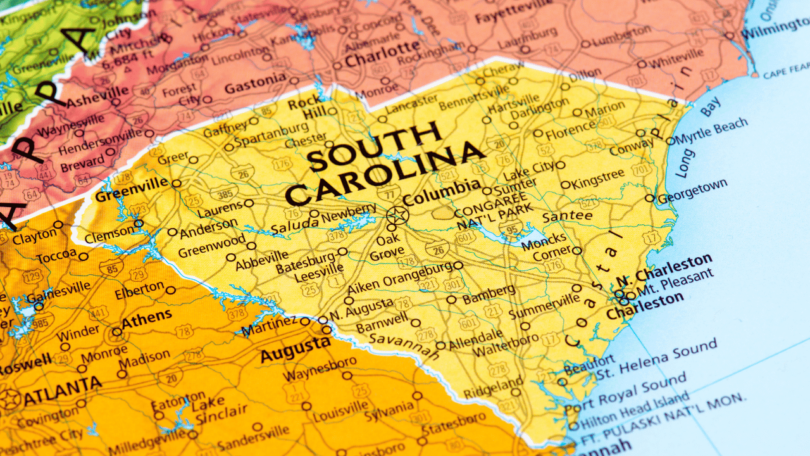Is Sports Betting Legal in South Carolina?
Sports betting remains illegal in South Carolina as of 2024, despite ongoing debates regarding its potential legalization. This article explores the legal framework, historical attempts at regulation, and prospects for the future of sports betting in the state.

Understanding South Carolina Sports Betting Laws
South Carolina maintains one of the most restrictive gambling laws in the United States. Sports betting, along with other forms of gambling, is prohibited under state law, reflecting a deeply rooted conservative approach.
However, South Carolinians have alternative options for betting, like traveling to neighboring states like North Carolina, where sports betting has recently been legalized.
While Daily Fantasy Sports (DFS) and pick’em-style platforms operate in a legal gray area, they provide limited avenues for residents to engage in sports-related wagering.
Despite ongoing discussions, significant barriers, including political resistance and the need for constitutional amendments, make the prospect of legal sports betting in South Carolina uncertain.
Exceptions to South Carolina’s Gambling Restrictions
While South Carolina’s gambling laws are among the most restrictive in the United States, certain exceptions provide limited avenues for lawful wagering and gaming activities. These could serve for an example of how carefully crafted allowances coexist within the state’s conservative legal framework.
State Lottery: The South Carolina Education Lottery, legalized in 2002, stands out as the most prominent exception. Established to fund public education and college scholarships, the lottery has gained widespread acceptance among residents.
Daily Fantasy Sports (DFS): Daily Fantasy Sports platforms such as DraftKings and FanDuel operate in South Carolina despite the lack of explicit regulatory clarity. Categorized as games of skill rather than gambling, DFS thrives in a legal gray area.
Pick’em Betting Apps: Applications like PrizePicks and Fliff, which focus on individual player outcomes rather than game results, also operate under the guise of skill-based gaming. While technically distinct from traditional sports betting, these platforms offer a comparable experience, gaining popularity as an alternative for sports enthusiasts.
Historical Context
South Carolina’s journey with sports betting legalization is long and fraught with complexities. The state has consistently maintained one of the strictest gambling stances in the U.S., rooted in historical laws like SC Code § 16-19-40 from 1802, which broadly bans most forms of gambling.
The 2017 Supreme Court decision allowing states to legalize sports betting sparked renewed interest in revisiting these laws. Since then, numerous legislative efforts have been made to amend the state constitution and regulate sports betting. Despite repeated attempts, such as bills HB 3102 (2017), H 3395 (2020), and HB 3749 (2023-2024), progress has been stymied by political opposition, a lack of gambling infrastructure, and the need for voter-approved constitutional amendments.

Advocates argue for the economic benefits of legalization, citing potential tax revenue and consumer protections. However, staunch resistance persists, rooted in moral concerns, fears of increased gambling addiction, and the state’s traditional values.
Attempts to Legalize Sports Betting in South Carolina
Efforts to legalize sports betting in South Carolina have been ongoing since the U.S. Supreme Court lifted the federal ban on state-authorized sports betting in 2017. Despite numerous legislative proposals, all attempts have failed, reflecting the state’s conservative approach to gambling.
Chronological Overview of Legislative Efforts
2017-2018: HB 3102 aimed to legalize sports betting alongside casino and horse race gambling. The bill stalled in the House committees.
2019-2020: Bills such as HB 3409, SB 57, and SB 71 sought to legalize sports betting and establish a gambling study commission. None advanced beyond committee review.
2021-2022: Proposals like HB 3395, SB 98, and SB 67 echoed earlier efforts but failed to progress due to strong opposition.
2022-2023: Two bills, including HB 5277 introduced by Representative Chris Murphy, focused on online gambling legalization. While one proposal advanced in the House, it failed to gain Senate approval.
2023-2024: HB 3749 proposed the legalization of up to eight sports betting apps. The bill remained in limbo in the House and expired without Senate review.
Key Stakeholders
Advocates:
Joe Cunningham: The 2022 gubernatorial candidate highlighted sports betting legalization as a potential source of tax revenue.
Chris Murphy and Russell Ott: State representatives actively pushing for online betting and horse race wagering legalization.
Sports Betting Alliance: A lobbying group advocating for regulated sports betting.
Opponents:
Governor Henry McMaster: A vocal critic of gambling, his opposition has been a significant roadblock.
Conservative Leadership: The state’s Republican establishment remains firmly against expanded gambling.
Predictions and Public Opinion
South Carolina’s neighbor, North Carolina, legalized sports betting in 2024, creating a competitive pressure. Early projections estimate North Carolina could generate over $60 million in annual tax revenue, increasing to $100 million by the fourth year. This success may influence South Carolina lawmakers to reconsider their stance.

Public opinion appears favorable; a 2017 survey found that 68% of South Carolinians supported limited gambling legalization. While the survey did not specifically address sports betting, it reflects a growing openness among residents.
Despite these encouraging trends, entrenched political opposition and a lack of gambling infrastructure present formidable barriers. Until significant political shifts occur—potentially after the 2026 gubernatorial elections—the legalization of sports betting in South Carolina remains an uphill battle.
Recent Developments in South Carolina Sports Betting
- [April 24, 2025]: South Carolina’s Casino and Betting Debate Heats Up
- [March 21, 2025]: South Carolina Sports Wagering Act (Bill 444) Targets Legal Betting in 2025-2026
- [December 17, 2024]: South Carolina Takes Another Shot at Legalizing Sports Betting with House Bill 3625
Online Sports Betting in South Carolina
The absence of legalized online sports betting in South Carolina underscores its conservative gambling framework. Despite legislative attempts, such as the failed HB 3749 in 2024, the state remains resistant to regulating this popular form of wagering.
This contrasts sharply with the 38 states that have embraced sports betting since the Supreme Court’s 2017 decision, creating a widening gap in accessibility and revenue potential.
Neighboring states illustrate the advantages of regulation. North Carolina’s recent entry into online sports betting has already generated significant tax revenue, showcasing the financial benefits of a legalized framework.
On the other hand, in the absence of state-sanctioned platforms, South Carolinians often rely on offshore sportsbooks. These unregulated entities present considerable risks, including a lack of consumer protections, potential for fraud, and no recourse for disputes. Users also expose themselves to data privacy vulnerabilities, emphasizing the need for a regulated, secure alternative.
Economic and Social Considerations
Legalizing sports betting in South Carolina presents a mix of economic opportunities and social challenges. While the potential financial benefits are significant, addressing the associated risks is essential to ensure responsible implementation.
Potential Tax Revenue
Sports betting legalization could unlock a substantial revenue stream for South Carolina. Drawing parallels with neighboring North Carolina, which generated over $50 million in tax revenue within five months of legalization, the financial potential is evident.
Estimates suggest South Carolinians wager approximately $2.5 billion annually on illegal platforms. Applying a proposed 10% tax rate to this activity could generate millions in state revenue, funding education, infrastructure, and public services.
Impact on Local Economy and Job Creation
A regulated sports betting market would stimulate South Carolina’s economy by creating new jobs across sectors such as customer service, technology, and compliance. Additionally, the influx of tax revenue could support local projects, fostering community development.
Beyond direct economic impact, secondary industries, such as tourism and entertainment, could also benefit as sports betting enhances local attractions.
Concerns Over Problem Gambling and Social Implications
Despite the economic allure, concerns about gambling addiction and financial instability loom large. Studies from states with legalized online betting show increased financial distress, including higher rates of bankruptcy and debt collection. These risks disproportionately affect lower-income individuals, exacerbating social inequalities.
To counteract these issues, implementing robust responsible gambling measures is essential. Consumer protections, educational campaigns, and accessible addiction treatment programs could mitigate the negative effects, ensuring that the benefits of legalization are balanced with the well-being of South Carolina’s residents.
By carefully managing these economic and social factors, South Carolina could harness the potential of sports betting while minimizing its risks. However, success will depend on creating a regulatory framework that prioritizes both fiscal responsibility and public welfare.
Alternatives to Sports Betting in South Carolina
While sports betting remains illegal in South Carolina, residents still have access to several legal gambling options and innovative platforms that offer alternatives to traditional wagering.
Legal Gambling Options in South Carolina
State Lottery: The South Carolina Education Lottery, a widely accepted form of gambling, offers games like Powerball and Mega Millions. The proceeds support education initiatives across the state. Tickets are available only through authorized retailers, as online sales are not yet permitted.

Horse Racing: Although South Carolina is home to horse racing events, wagering on races, including pari-mutuel betting and online platforms like Advance Deposit Wagering (ADW), is prohibited under state law.
Daily Fantasy Sports (DFS): DFS platforms operate in a legal gray area in South Carolina, as they are classified as games of skill rather than gambling. This distinction allows platforms like DraftKings and FanDuel to offer their services without regulatory interference.
Popular DFS Platforms in South Carolina
- DraftKings and FanDuel: These industry leaders provide a variety of contests, including pick’em games and daily fantasy leagues across multiple sports.
- PrizePicks: Specializing in pick’em contests, PrizePicks allows players to wager on individual athlete performances rather than game outcomes.
- Underdog and Sleeper: These platforms offer both traditional fantasy leagues and innovative pick’em-style betting.
- Boom Fantasy and ParlayPlay: Providing creative formats and diverse payout structures, these apps cater to players seeking more dynamic gaming experiences.
For South Carolinians, these options provide a legal and engaging alternative to traditional sports betting. Platforms like DFS bridge the gap between outright prohibition and demand for interactive gaming, offering residents a way to participate in skill-based competitions without violating state laws.
The Future of Sports Betting in South Carolina
The future of sports betting in South Carolina hinges on upcoming legislative actions and the growing pressure from neighboring states’ successes. Although progress has been slow, market trends and potential economic benefits suggest an eventual shift toward legalization.
Representative Chris Murphy plans to introduce a new sports betting bill during the legislative session starting in January 2025. This proposal is expected to draw heavily from the regulatory frameworks of North Carolina and Tennessee, both of which have successfully implemented online sports betting. The upcoming session will be a pivotal moment for sports betting advocates in the state.
Stephen Shapiro, a sports business expert at the University of South Carolina, believes there is a strong chance sports betting will be legalized in the next few years. He notes that the financial success of neighboring states makes legalization an increasingly attractive prospect for lawmakers. However, staunch opposition from Governor Henry McMaster, who has vowed to veto any sports betting legislation, remains a formidable hurdle.
The 2025 legislative session, combined with mounting public support and economic incentives, will likely shape the trajectory of sports betting in South Carolina. While hurdles remain, the state’s lawmakers face growing pressure to align with national and regional trends, suggesting that the legalization of sports betting is no longer a question of if, but when.
Is sports betting legal in South Carolina?
No, both online and in-person sports betting are illegal in South Carolina. Despite numerous legislative efforts since 2017, the state has not passed any laws to legalize this form of gambling.
Can I bet on sports online in South Carolina?
No, there are no legal, regulated online sports betting platforms in South Carolina. However, offshore platforms accept South Carolinian players. These sites operate outside U.S. jurisdiction and lack consumer protections, making their use risky.
What is the legal gambling age in South Carolina?
The legal gambling age in South Carolina is 21. Some offshore betting platforms may accept players as young as 18, but participating under state law is still considered illegal.
Are daily fantasy sports legal in South Carolina?
Daily Fantasy Sports (DFS) operate in a legal gray area in South Carolina. Platforms like DraftKings and FanDuel are not explicitly regulated but continue to function under the classification of skill-based gaming rather than gambling.
When will sports betting be legal in South Carolina?
There is no definitive timeline for legalizing sports betting in South Carolina. While Representative Chris Murphy plans to propose a new bill in the 2025 legislative session, strong political opposition, including from Governor Henry McMaster, makes the future uncertain. Legalization depends on shifts in political support and public advocacy.
Recommended

